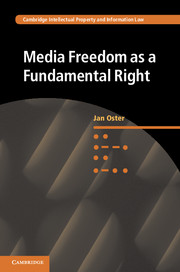Book contents
- Frontmatter
- Contents
- Preface and acknowledgements
- Table of cases
- Treaties, Conventions, Declarations and Statutes
- Reports and other documentary sources
- Introduction: aim, scope and method
- Part I The theoretical foundations of media freedom
- Part II General rules on media freedom
- Part III Specific limitations to media freedom
- 7 Personality rights and intellectual property as ‘rights of others’
- 8 Threats to public order interests: national security, territorial integrity, public safety and prevention of disorder and crime
- 9 The protection of health and morals
- 10 Maintaining the authority and impartiality of the judiciary
- 11 Incitement to hatred
- 12 Religiously offensive publications
- 13 Restrictions on commercial publications
- 14 Media pluralism
- Conclusion: tenets of a Media Freedom Principle
- Bibliography
- Index
- Cambridge Intellectual Property and Information Law
7 - Personality rights and intellectual property as ‘rights of others’
from Part III - Specific limitations to media freedom
Published online by Cambridge University Press: 05 June 2015
- Frontmatter
- Contents
- Preface and acknowledgements
- Table of cases
- Treaties, Conventions, Declarations and Statutes
- Reports and other documentary sources
- Introduction: aim, scope and method
- Part I The theoretical foundations of media freedom
- Part II General rules on media freedom
- Part III Specific limitations to media freedom
- 7 Personality rights and intellectual property as ‘rights of others’
- 8 Threats to public order interests: national security, territorial integrity, public safety and prevention of disorder and crime
- 9 The protection of health and morals
- 10 Maintaining the authority and impartiality of the judiciary
- 11 Incitement to hatred
- 12 Religiously offensive publications
- 13 Restrictions on commercial publications
- 14 Media pluralism
- Conclusion: tenets of a Media Freedom Principle
- Bibliography
- Index
- Cambridge Intellectual Property and Information Law
Summary
Article 19(3)(a) ICCPR, Article 10(2) ECHR, Article 27(2) AfCHPR and Article 13(2)(a) ACHR state that the exercise of freedom of expression may be subject to, inter alia, restrictions as are necessary for the protection of the rights of others. With regard to limitations on media freedom, the most relevant ‘rights of others’ are the rights relating to one's personality: the right to respect for honour, reputation and privacy according to Article 17 ICCPR and Article 11 ACHR, and the right to private life according to Article 8(1) ECHR and Article 7 EUChFR. A personality right in the broader sense is freedom of religion according to Article 18 ICCPR, Article 9(1) ECHR, Article 8 AfCHPR and Article 12 ACHR. Further ‘rights of others’ are intellectual property rights and other exclusive rights.
On a sidenote, neither privacy nor reputation is constitutionally protected in the United States. This accounts for many of the divergencies between the Supreme Court's and international adjudicators’ case law.
The taxonomy of ‘personality rights’
The wording of international conventions is not coherent regarding the protection of honour, reputation and privacy. Article 17 ICCPR is the only provision expressly protecting privacy, honour and reputation. Article 8 ECHR, Article 7 EUChFR and Article 11 ACHR use the term ‘private life’ instead of ‘privacy’, and Article 8 ECHR does not expressly protect honour and reputation at all. However, it is submitted that the ICCPR, the ACHR and the ECHR/EUChFR merely use different terms for the same legal concept. Together with the right to privacy, honour and reputation are thus sub-categories of the concept of ‘private life’. For this reason, the reference to ‘reputation’ in Article 10(2) ECHR is redundant.
The distinction between reputation and privacy is based on the dichotomy of factual information and comment, and the further distinction between true and false factual information.
- Type
- Chapter
- Information
- Media Freedom as a Fundamental Right , pp. 147 - 192Publisher: Cambridge University PressPrint publication year: 2015



